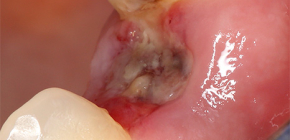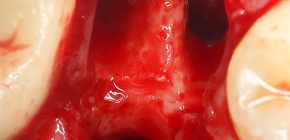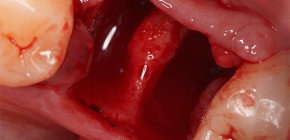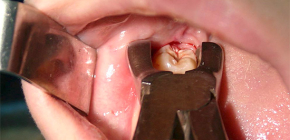Surgery

1-3 days after tooth extraction, sometimes problems arise: the temperature rises, bad breath and severe pain in the gums and in the hole in place of the extracted tooth, worse when chewing. It is the inflammation of the walls of the hole or, in other words, the alveolitis that provokes these symptoms, sometimes creating the feeling in a person that the diseased tooth was not removed at all, but continues to bother even more, although it would seem that the dentist-surgeon has long removed all the roots. We will talk further about the causes of the appearance of alveolitis, as well as about the methods for its treatment and prevention ...

After tooth extraction, the blood sometimes does not stop for a long time - sometimes it comes to the point that bleeding from the hole may not stop for days. However, knowing a couple of simple ways, you can often stop the blood without leaving your home. However, there are situations when no home methods can help, because bleeding can be associated with certain problems in the body, which also need to be known in advance. Next, we will talk about the true causes of situations when blood from a hole cannot stop for hours, we will learn three ways to quickly stop bleeding at home, and also we will penetrate into some secrets of the professional “kitchen” of dental surgeons, whose working methods are also very interesting.

Tooth extraction is an extreme measure, which is resorted to only when, for certain reasons, it can no longer be saved. When a dental surgeon removes a diseased tooth, the patient may think that all the suffering and past fears are left behind, and there is nothing more to worry about. However, this is a profound error. As soon as the euphoria after a successful operation has passed, there is an understanding that in the mouth, after all, a bloody wound that often bleeds for a long time, is in no hurry to heal, sometimes festering and is very painful. How long will the injured gum and hole heal, what factors affect this and how can the process be accelerated by protecting oneself from possible serious complications? Let's figure it out ...

Tooth extraction for many people is a frightening procedure. The patient is also afraid of the consequences that may arise after such a surgical intervention, in particular, prolonged bleeding, swelling of the gums, suppuration, and other complications. And there really is reason for such worries, however, with correctly performed manipulations, the risks of complications after tooth extraction are minimal, especially if a person has the skills to care for the hole after the procedure. The ability to recognize this or that complication in time can effectively prevent its negative consequences. These are the moments we will continue to examine in more detail so that wound healing takes place as quickly and comfortably as possible.
